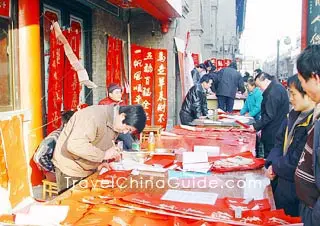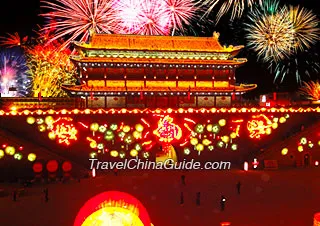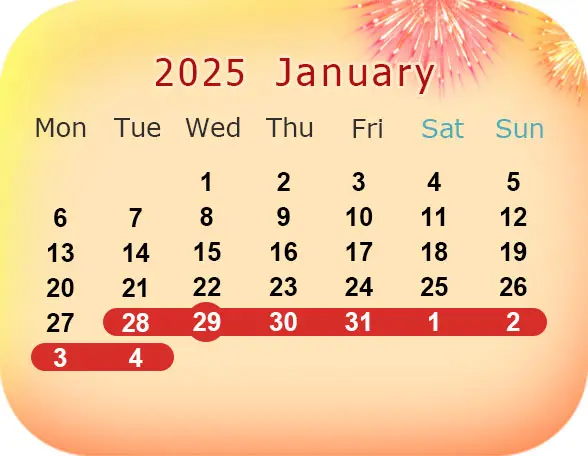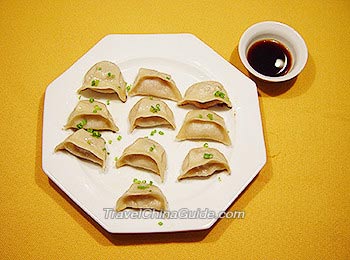

最早的春节:相传中国原始社会时就有“腊祭”之说不得,夏朝建立后,此俗流传下来。《尔雅》一书说春节: “夏曰岁,商曰祀,周曰年” 。
最早的除夕:中国农历年的最后一天晚上称为 “除夕”。 “除夕”源于先秦时期的“逐除”。根据《吕氏春秋》中记载:古人在新年的前一天,击鼓驱逐“疫病之鬼”,这就是“除夕”的由来。而最早提到“除夕”这一名称的,是西晋周处的《风土记》。
最早的春联:据《宋史》记载:宋灭蜀的前一年,(公元964年)除夕,后蜀主孟槌写下“新年纳余庆,嘉节号长春”,这是被人们公认的第一副春联。
最早的年画:年画的前身叫门画,最早的年画形式是门神,画的是神话传说中神茶、郁垒,也有的在门上画虎或古代勇士像,到了宋代演变为木版年画。
最早的贺年片:早在宋代就已出现了赠送贺年片的习俗。据南宋人张世南《游宦纪闻》里记载,其家藏有北宋元祐年间敬贺正旦的墨迹。“正旦”就是正月初一,“敬贺正旦”就是现在贺年片上印的“恭贺新年"的意思。
最早的爆竹:春节爆竹之俗始于汉代,当时没有火药纸张,所谓爆竹,是用火烧竹子发出的啪啪声。
最早的压岁钱:据古籍《开元天宝遗事》记载,压岁钱最早出现在唐玄宗天宝年间,嫔妃们在春节三五结伴做掷钱游戏,宫廷钱库就散些钱给她们。此风在当时宫廷内是很盛行的。
|
|
 |
| Writing Festival Couplets |
It comes on the first day of Chinese lunar calendar and lasts for almost half of a month. But in folk custom, this traditional holiday lasts from the 23rd day of the twelfth month to the 15th day of the first month (Lantern Festival) in the lunar calendar. Among these days, the New Year’s Eve and the first day of the New Year is the peak time. The exact days are different in every year according to the lunar calendar. Schedule of Spring Festival in recent years is offered in the following table.
| Year | Date | Holiday | Chinese Zodiac |
| 2012 | January 23 | January 22 - 28 | Dragon |
| 2013 | February 10 | February 9 - 15 | Snake |
| 2014 | January 31 | January 31 - February 6 | Horse |
| 2015 | February 19 | February 19 - 25 | Sheep |
| 2016 | February 8 | February 8 - 14 | Monkey |
| 2017 | January 28 | January 28 - February 3 | Rooster |
 |
| Couplets and Decorations |
It is said that the custom of Spring Festival started in when people offered sacrifice to ancestors in the last month of Chinese lunar calendar. At that time, people prepared the sacrifice by doing thorough cleaning, having bathes and so on. Later, people began to worship different deities as well on that day. It is the time that almost all the farm works were done and people have free time. The sacrificing time changed according to the farming schedule and was not fixed until the Han Dynasty (202BC-220AD). The customs of worshipping deities and ancestors remains even though the ceremonies are not as grand as before. It is also the time that spring is coming, so people held all kinds of ceremonies to welcome it.
There are many legends about Spring Festival in Chinese culture. In folk culture, it is also called “guonian” (meaning “passing a year”). It is said that the “nian” (year) was a strong monster which was fierce and cruel and ate one kind of animal including human being a day. Human beings were scared about it and had to hide on the evening when the “nian” came out. Later, people found that “nian” was very scared about the red color and fireworks. So after that, people use red color and fireworks or firecrackers to drive away “nian”. As a result, the custom of using red color and setting off fireworks remains.
Preparing the New Year starts 7 days before the New Year’s Eve. According to Chinese lunar calendar, people start to clean the house on Dec. 24, butcher on Dec. 26th and so on. People have certain things to do on each day. These activities will end Jan. 15th of the lunar calendar.
 |
| Paper Cut of Character 'Fu' Meaning Happiness and 'Feng' Meaning Harvest |
The Spring Festival is a start for a new year, so it is regarded as the omen of a year. People have many taboos during this period. Many bad words related to “death”, “broken”, “killing”, “ghost” and “illness” or “sickness” are forbidden during conversations. In some places, there are more specific details. They consider it unlucky if the barrel of rice is empty, because they think they will have nothing to eat in the next year. Taking medicine is forbidden on this day, otherwise, people will have sick for the whole year and take medicine constantly.
 |
| Dumplings, Traditional Food of Spring Festival |
In China, different places have their own traditions and activities to celebrate the Spring Festival. Beijing, Guangzhou, Xian and Pingyao are some good places to go if one intends to come during the time period. If one does not want to travel so long, but still want to enjoy the atmosphere of Chinese New Year, the local Chinatown is the best place.
New Year Greetings
- Frequently Used Blessing Words
-
Happy New Year!

-
Happy New Year!

-
Happy New Year!

-
Happy Spring Festival!

-
Happy Spring Festival!

-
Wish you a happy new year!

-
Wish your family a happy Spring Festival!

-
Wish all of you a happy Spring Festival!

-
Happy New Year!

-
May all your wishes come true!

-
May all your wishes be fulfilled!

-
Good luck!

- For Fortune and Career
-
Wish you prosperity!

-
May a river of gold flow into your pocket!

-
May you earn more fortune!

-
Business flourishes!

-
Harmony brings wealth!

-
Money and treasures will be plentiful!

-
Treasures fill the home!

-
May you have promotion every year!

-
May you realize your ambition!

-
Hope everything goes well with your work!

-
Wish you every success in your career!

-
Have a meteoric rise in life!

-
Have a meteoric rise (said of career or social position)!

-
Win success immediately upon arrival!

- For Family and Health
-
Literally meaning ‘Spirit of Dragon and Hose’. Hope you will be full of vigor.

-
May you peaceful all year round!

-
Wish you good health!

-
May you live a happy life with your family!

-
Wish you every success!

-
Hope everything goes well!

-
Best of luck!

-
Wish you a happy family!

-
May you have surpluses and bountiful harvests every year!

- For students
-
Wish you every success in your studies!

-
Make progress in your studies!

-
Succeed in the examinations!





